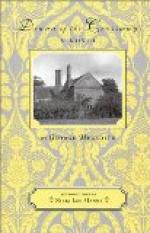which keep the really numerically better-half of the
population in a state of slavery. If he had
been a lawyer! It must be a lawyer’s initiative—a
lawyer’s Bill. Mr. Percy Dacier also spoke
well, as might have been expected, and his uncle’s
compliment to him was merited. Should you meet
him sound him. He has read for the Bar, and is
younger than Mr. Redworth. The very young men
and the old are our hope. The middleaged are
hard and fast for existing facts. We pick our
leaders on the slopes, the incline and decline of
the mountain—not on the upper table-land
midway, where all appears to men so solid, so tolerably
smooth, save for a few excrescences, roughnesses,
gradually to be levelled at their leisure; which induces
one to protest that the middle-age of men is their
time of delusion. It is no paradox. They
may be publicly useful in a small way. I do not
deny it at all. They must be near the gates of
life—the opening or the closing—for
their minds to be accessible to the urgency of the
greater questions. Otherwise the world presents
itself to them under too settled an aspect—unless,
of course, Vesuvian Revolution shakes the land.
And that touches only their nerves. I dream
of some old Judge! There is one—if
having caught we could keep him. But I dread
so tricksy a pilot. You have guessed him—the
ancient Puck! We have laughed all day over the
paper telling us of his worrying the Lords.
Lady Esquart congratulates her husband on being out
of it. Puck ‘biens ride’ and bewigged
might perhaps—except that at the critical
moment he would be sure to plead allegiance to Oberon.
However, the work will be performed by some one:
I am prophetic:—when maidens are grandmothers!—when
your Tony is wearing a perpetual laugh in the unhusbanded
regions where there is no institution of the wedding-tie.’
For the reason that she was not to participate in
the result of the old Judge’s or young hero’s
happy championship of the cause of her sex, she conceived
her separateness high aloof, and actually supposed
she was a contemplative, simply speculative political
spirit, impersonal albeit a woman. This, as
Emma, smiling at the lines, had not to learn, was always
her secret pride of fancy—the belief in
her possession of a disengaged intellect.
The strange illusion, so clearly exposed to her correspondent,
was maintained through a series of letters very slightly
descriptive, dated from the Piraeus, the Bosphorus,
the coasts of the Crimea, all more or less relating
to the latest news of the journals received on board
the yacht, and of English visitors fresh from the
country she now seemed fond of calling ‘home.’
Politics, and gentle allusions to the curious exhibition
of ‘love in marriage’ shown by her amiable
host and hostess: ’these dear Esquarts,
who are never tired of one another, but courtly courting,
tempting me to think it possible that a fortunate selection
and a mutual deference may subscribe to human happiness:—filled




